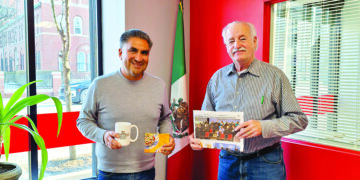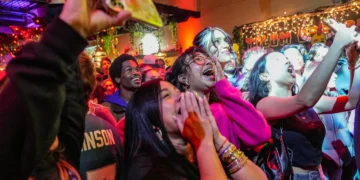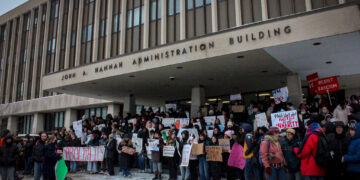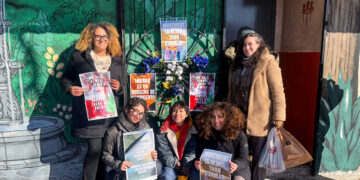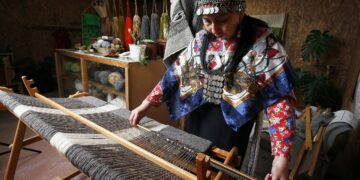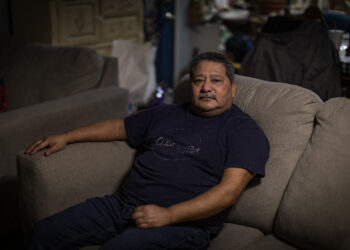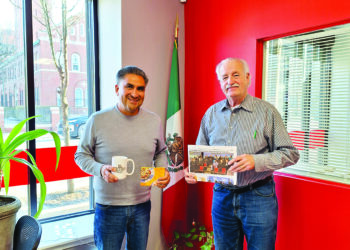Maurizio Dominguez stood shoulder to shoulder beside fellow creatives at the Alfred Brush Ford Park Community Center last Wednesday afternoon looking to solve the everyday problems that keep local filmmakers like him scrambling for crew and permits. “I’m hoping to network. To meet people like DPs (Directors of Photography), colorists, crew members, and actors,” he explained. “Any project requires a team, so the more people you connect with, the easier it is.”
During Film Detroit’s first community outreach and resource fair, held on September 10, filmmakers networked with fellow crew members, got straight answers about city permits, and learned how to submit work to Detroit’s public access channels, including Channels 22 and 68. The drop-in format meant anyone could attend—no registration, no experience required, just Detroiters showing up hoping to turn expertise and excitement into real connections so that they could, ultimately, crew up and create films.
“In the past, working with the Film Office felt like sending an email and maybe hearing back weeks later, maybe not at all. It didn’t feel open or accessible,” Dominguez noted. Rather than wait for permits, many Detroit filmmakers just start shooting, the same way musicians here record in basements and visual artists transform abandoned buildings into galleries. It’s part of Detroit’s creative DNA: if the system doesn’t work for you, build your own. But that approach also means missing out on resources and protections that proper permits provide. “If these events continue and resources are brought directly to filmmakers, that will go a long way,” Dominguez said .

Film Detroit Program Coordinator Chantal Cook and her team set up the fair, the first of its kind for the organization, to remove the typical hurdles that make it hard for filmmakers to get city support. “This event was about welcoming everybody. We didn’t do registration or sign-ups because we didn’t want to put a cap on it,” Cook said. She handles permit applications and builds relationships with Detroit schools, nonprofits, and independent studios.
During her presentation, Cook pulled back the curtain on applying for film permits and revealed a new public access channel launching this month: the long-running “Channel 22 is for high school and college students, nonprofits, and youth groups. It’s more education-based…” And the newly launching “Channel 68 is for indie filmmakers and adults—documentaries, music videos, interviews, or even someone’s first film.”
Cook’s welcoming approach to submissions had already paid off before the fair even started. “We’re not looking for only Spike Lee-level movies. I’m not going to be a harsh critic,” she explained, adding that 10 to 20 filmmakers had already sent in work before submissions officially opened Wednesday. “People are eager and want their content on our channels,” she said.
Kiara Williams attended the fair to advance her own Detroit-focused business development while connecting with the film community. As founder of Treuse Cinema, a boutique movie theater she hopes to one day build in Downtown, Williams used the networking opportunity strategically “to collect consumer data.” She explained, “I’m running a survey for Detroiters who love movies and live relatively close to Downtown.”
Williams sees movies as a way to build connections between neighbors and showcase authentic Detroit stories, explaining, “Detroit is Black, Detroit is creative, Detroit is strong, and I resonate with that.” When asked what Williams needs most to see her project through, the answer was clear: “capital.” She’s not alone in that struggle. It’s the barrier that came up repeatedly during Wednesday’s conversations.
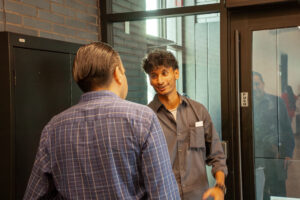
“The number one challenge is funding,” Dominguez said, acknowledging what the outreach event couldn’t solve with permits and networking alone. “Raising enough money to put a project into production is tough. A lot of people start passion projects, but without money behind them, it’s like swimming against the current.” But in a city where immigrant communities like ours help shape the creative landscape, some filmmakers face legal barriers layered on top of financial ones.
Saattik Das navigated the fair knowing his visa status creates complications most filmmakers don’t face. The Troy resident, who moved from Kolkata, India, when he was two, can’t legally get paid for film work. “So I focus on helping people complete their vision, and have them help me complete mine, without the logistical side getting in the way,” he explained.
While the visa complications don’t seem to get any easier to handle in the near future, Das, a Wayne State marketing student, still manages to find value that extends beyond just growing his career. “Even if the rest of the world doesn’t care who I am, this place does,” said Das. According to Dominguez, that caring community Das references has been supporting Detroit filmmakers through informal networks for years.
Dominguez mentioned there are Facebook groups where people share tips about getting sponsorships or resources, and while that virtual community exists, “it’s good to see the city recognizing it and getting involved.”
Cook’s team discovered just how much filmmakers wanted that official support when they started reaching out and designed the fair to strengthen connections that already exist within it. “We’re trying to build connections,” she said, gesturing toward attendees sharing equipment tips and swapping Instagram handles, “to become that hub where we can give and share resources in the community. We want to create space where people can network, collaborate, have panels and workshops.”
The outreach event was just the beginning for Cook, who plans monthly community events throughout the city. Cook hopes the next gathering will flip the format. Instead of learning about permits and distribution, the team is exploring hosting a panel of experienced Detroit filmmakers to offer advice and feedback on locally created projects. For now, Cook said, “just our presence at events like this means something. This is our first one, but we’ll be out every month, hitting the pavement, opening our doors, and sharing knowledge.”
Anyone ready to submit work to Channels 22 and 68 can do so at http://tinyurl.com/4k2jk3wb
Film Detroit trae recursos de la industria directamente a los residentes de Detroit
Maurizio Domínguez estuvo el miércoles pasado en el Alfred Brush Ford Community Center, rodeado de otros creativos que, como él, buscan resolver los problemas de siempre: conseguir equipo de grabación, permisos y gente para trabajar en sus películas.
“Quiero conocer a más personas —directores de cámara, coloristas, actores, crew—. Cualquier proyecto necesita un equipo, y entre más gente conozcas, más fácil se hace”, explicó.
El evento fue la primera feria comunitaria de recursos de Film Detroit, el 10 de septiembre. Allí, los cineastas pudieron platicar con otros colegas, aprender cómo tramitar permisos de la ciudad y descubrir cómo enviar su trabajo a los canales públicos 22 y 68 de Detroit. No había que registrarse ni tener experiencia: solo llegar con ganas de conectar y crear.

Antes, trabajar con la Oficina de Cine se sentía como mandar un correo y esperar semanas —a veces sin respuesta—, contó Domínguez. Por eso, muchos cineastas de Detroit simplemente filman sin permiso, igual que músicos graban en sótanos o artistas convierten edificios abandonados en galerías. Esa rebeldía es parte del ADN creativo de la ciudad. Pero también significa perder acceso a recursos y protecciones que dan los permisos oficiales. “Si estos eventos continúan y los recursos llegan directo a los cineastas, será un gran avance”, dijo Domínguez.
Chantal Cook, coordinadora del programa de Film Detroit, organizó la feria para quitar trabas y acercar el apoyo de la ciudad. “Queríamos dar la bienvenida a todos. No pedimos registro porque no queríamos poner un límite”, explicó. Ella maneja solicitudes de permisos y también conecta con escuelas, organizaciones sin fines de lucro y estudios independientes.
En su presentación, Cook explicó cómo pedir permisos de filmación y anunció dos nuevos canales públicos: Canal 22, pensado para estudiantes, organizaciones juveniles y proyectos educativos; y Canal 68, abierto a cineastas independientes y adultos, con documentales, videos musicales, entrevistas o incluso una primera película.
Cook aclaró que no buscan solo producciones de nivel “Spike Lee”. “No voy a ser una crítica dura”, dijo. De hecho, antes de que abriera oficialmente la convocatoria, ya habían recibido de 10 a 20 proyectos.

Entre los asistentes estuvo Kiara Williams, fundadora de Treuse Cinema, un cine boutique que sueña con abrir en el centro de Detroit. Ella aprovechó el evento para hacer encuestas a Detroiters amantes del cine. “El cine es una forma de conectar vecinos y contar historias auténticas de Detroit. Detroit es negro, es creativo, es fuerte, y me identifico con eso”, dijo. Lo que más necesita para hacer realidad su proyecto: capital. Esa falta de dinero fue la barrera más mencionada en las conversaciones del miércoles.
“Lo más difícil es conseguir fondos”, señaló Domínguez. “Sin dinero, muchos proyectos quedan como sueños. Es como nadar contra la corriente”. Para cineastas inmigrantes, además del dinero existen trabas legales.
Saattik Das lo sabe bien. Vive en Troy, vino de India de niño y, por su visa, no puede cobrar por su trabajo fílmico. “Me enfoco en ayudar a otros a completar su visión, y ellos me ayudan a completar la mía, sin que lo legal se interponga”, explicó. Aunque las complicaciones no desaparecen, Das encuentra valor en la comunidad: “Aunque el mundo no sepa quién soy, aquí sí importa”.
Domínguez coincidió: “Ya existen redes informales en Detroit, como grupos de Facebook donde la gente comparte tips. Pero es bueno ver que la ciudad lo reconozca y se meta”.
El equipo de Cook diseñó la feria justo para fortalecer esas conexiones. “Queremos crear un espacio donde la gente pueda colaborar, compartir recursos, hacer talleres y paneles”, dijo. Y no será el último evento: Film Detroit planea organizar encuentros cada mes. “Apenas es el inicio, pero vamos a estar presentes en la comunidad, saliendo a las calles y compartiendo conocimiento”, aseguró Cook.
Quien quiera enviar trabajos a los canales 22 y 68 puede hacerlo aquí: formulario de envío. Ambos canales lanzan este mes, y cada pieza estará al aire unas cuatro semanas.











